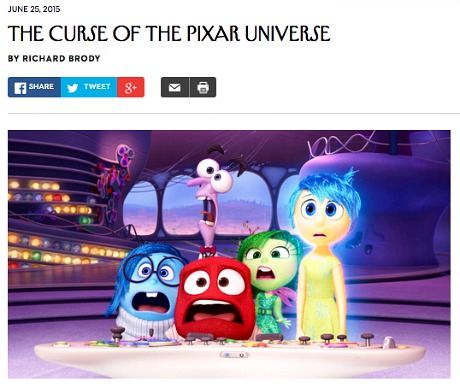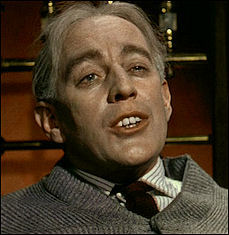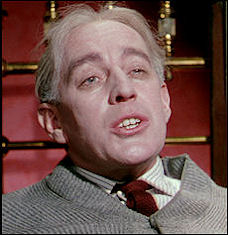“Life is a bombed-out, soulless cabaret in Christian Petzold’s Phoenix (IFC Films/Sundance Selects, 7.24), a haunting portrait of identity, loss and the search for answers in post-WWII Berlin. The sixth teaming of Petzold and his leading-lady muse, the extraordinary Nina Hoss, finds the duo once again refracting the social and political complexities of 20th-century Germany through the prism of American genre films — here, specifically, the rich strain of doppelganger psychodramas (A Woman’s Face, Vertigo, Seconds) that hinged on the immutable power of the human face. Like those movies, Phoenix demands a certain generous suspension of disbelief that may be more than some audiences are willing to muster.” — from a 1.12.15 review by Variety‘s Scott Foundas.
Day: June 28, 2015
Turnaround
Five days ago I conveyed enthusiasm about episode #2 (airing tonight) of the second season of HBO’s True Detective, or more particularly about something that happens toward the end. (“Okay, now things have kicked into gear.”) Well, hold up on that. I’ve since seen episode #3 and what I thought…best not to say any more.
Stuck In Craw
Brokeback Mountain isn’t quite ten years old. It popped at the 2005 Telluride Film Festival (i.e., on or about Labor Day) and opened commercially on 12.23.05. But that isn’t stopping Variety from revisiting the film for its Marriage Equality issue. I think it goes without saying that in the wake of the Supreme Court’s marriage equality decision and the alpha vibes that have followed that if the whole Brokeback Mountain-vs.-Crash competition had never happened a decade ago and that if both films were set to open this fall…I don’t think there’d be any question that Brokeback Mountain would be the decisive industry favorite.
It might still lose the Best Picture Oscar because…well, because The Revenant or Steve Jobs or The Danish Girl might win. But if 2015 was to somehow shake down into the same kind of face-off, Brokeback would be on top. The geezers who either voted against it or even refused to see it ten years ago would be far less influential, in part because a lot of them (including Tony Curtis, who once declared that “Howard Hughes and John Wayne wouldn’t like it”) have passed on. You have to let this stuff go, of course. Major cultural events happen in their own time and for their own reasons and you can’t reconstitute those circumstances, but I’ll never get over the Best Picture loss of Brokeback Mountain…not entirely.
Return of Pink Ladykillers…Beware!
Don’t be suckered into buying Studiocanal’s 60th anniversary Bluray of Alexander McKendrick‘s The Ladykillers, which as far as I know is a re-issue of the same Bluray that popped in February 2010. The cover of the newbie claims to be “digitally restored” but that could mean anything. Trust me — this is one of the ugliest and most repellent Blurays ever released in the history of the format, right up there with Criterion’s Stagecoach and the original grainstorm pressing of The Third Man. In my original review I called it “a strawberries-and-whipped-cream nightmare — perhaps the most visually unappealing manipulation of a classic film ever issued. It’s saturated with the brightest and bleachiest white light seen anywhere since the aliens stepped out of the mother ship at the end of Close Encounters. It’s like someone turned down the color key and then poured milk and cherry sauce over the master negative. The effect is one of rosey anemia — a sickly dilution like nothing I’ve ever seen from a 1950s color film.”

Brent Lang Is A Cyborg
There are two forehead-slapping statements in a 6.28 boxoffice analysis piece by Variety‘s Brent Lang. Titled “Ted 2 Fumbles: Are R-Rated Comedies in a Funk?,” the piece seeks to understand or at least ask why Seth MacFarlane‘s decidedly unfunny, splooge-soaked sequel opened with a lousy $32.9 million…horrors! Lang’s basic takeaway is that “raunch isn’t selling like it once did.”
Forehead slapper #1: “The difficulty is that unlike other genres, novelty is a key selling point for comedies. That makes them unusually execution dependent.”
Wells reaction: May God protect Hollywood executives and their shitty mainstream movie slates from the dreaded, fang-toothed beast known as “execution dependent.” In Lang’s realm, execution is a mosquito that occasionally flies into your ear. Swat it and forget about it. Because in Lang’s realm audiences regard the concept of quality in the same light. They never evaluate comedies by way of the aggregate sites or trailers or even by sniffing the wind…right? Lang and his sources in production and box-office analysis (including the legendary Phil Dergarabedian!) apparently believe that if you put a raunchy comedy on their plate, they’ll eat it up like a starving dog. Or they used to, at least. If there’s one thing that’s absolutely verboten in Lang’s world, it’s the idea that people might not want to see a movie that reputedly sucks.
A Significant Wounding
Every nine months or so New Yorker film columnist Richard Brody will tap out something marvelous, which is to say an opinion I agree with. The topic this time is Inside Out, which drove Brody crazy for reasons that are much more specifically explained and dissected than I cared to get into in my little piffle reviews. I didn’t care that much; I just can’t stand the oppresively peppy energy of mainstream animated features. But Brody, man…Brody goes into the mouth of the leviathan with a scalpel and slides down the gullet and eventually finds the giant Pixar heart and stabs, slices and severs with precision…covering himself in whale blood.

Excerpt #1: “Since the subject of Inside Out is life lived in the grip of emotions, let me admit to mine: I emerged from the theatre feeling like W. C. Fields, hating children, all children, even my children, because of what those who purport to make movies for them have been doing, both to movies and to children.
Excerpt #2: “For all the cleverness of Inside Out I was jolted from the start by its deformation of children and of mental life. I saw a feature-length sales pitch — or, worse, an indoctrination — to mold kids into beings as artificial and uniform as those created, by computer graphics, in the movie. In effect, Inside Out is a feature-length training manual for seeing life like a Pixar movie, an imprint machine for creating its own consumers.


